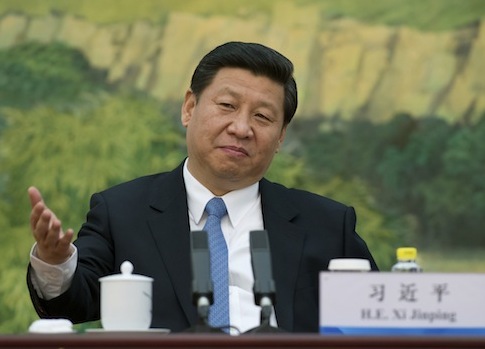China has become the world’s premier developer and exporter of abusive equipment used for torture, according to a new report.
The report released this week by Amnesty International and the Omega Research Foundation found that more than 130 Chinese companies, including several that are state-owned, develop and trade "tools of torture and repression."
While the groups said some of the equipment has a legitimate law enforcement purpose if used with the proper constraints, other tools are "intrinsically cruel, inhuman, and degrading." Those include neck-and-wrist combination cuffs, rigid restraint chairs, batons with metal spikes, and electric shock stun guns and batons.
One state-owned enterprise, China Jing’an Equipment Import/Export Corporation, advertises 38mm tear gas grenade launchers and electric shock stun guns, batons, and shields. China Xinxing Import/Export Corporation, another state-owned company, markets handcuffs, restraint chairs, and electric shock weapons while boasting that its trade with Africa reached $100 million in 2012.
"The Chinese authorities should prohibit the production, use, and export of ‘tools of torture,’" the report said. "China must also reform its export licensing system for law enforcement equipment, making the system transparent and publicly accountable. Strict, human rights-based criteria must be applied and met before export licenses are issued."
In contrast to China, both the European Union and United States have implemented strict export controls on equipment prone to abuse. The Chinese government does not make its decisions on whether to grant or deny export licenses public, so little is known about the process.
China says it has officially banned the use of torture domestically and that it abolished its notorious "re-education through labor" system in December 2013. However, methods of torture are still employed at extrajudicial "black jails" housed in hotels, psychiatric facilities, and state or residential buildings.
Chinese authorities continue to violently suppress protests by Tibetans and Uighurs, minorities that have long complained of repression of their cultural identities by Beijing.
Equipment for torture is now being exported globally. The firm Jiangsu Anhua says it has sold equipment to more than 50 countries in Africa, South America, and the Middle East. Chinese-made law enforcement equipment has reportedly been used in Ghana, Senegal, Egypt, Madagascar, Nepal, Cambodia, and Thailand.
Ugandan police employed "anti-riot" equipment from the Chinese state-owned firm Poly Technologies in April 2011 to crack down on protests against rising food and fuel prices. At least nine people were killed and more than 100 were injured.
Armored police vehicles, water cannons, and tear gas provided by Poly Technologies were also involved in the Democratic Republic of the Congo’s efforts to quell unrest surrounding the November 2011 elections, when 33 died and 83 were injured.
A U.S. State Department spokesperson expressed concerns about the torture report but did not comment on whether the United States would push for sanctions against the Chinese companies.
"We urge China to exercise due diligence so that its exports are not used in a manner inconsistent with respect for universal human rights," the spokesperson said.
Rep. Chris Smith (R., N.J.), one of the most outspoken U.S. lawmakers on Chinese human rights abuses, introduced a bill in July that would impose visa restrictions and financial sanctions on individuals who violate the rights of Chinese nationals and their family members. It would also delay or revoke the visas of executives with Chinese state-owned media organizations in retaliation for China’s widely criticized treatment of U.S. journalists and news outlets.
